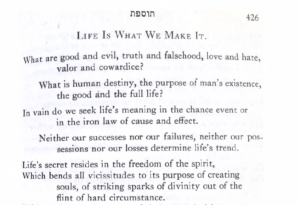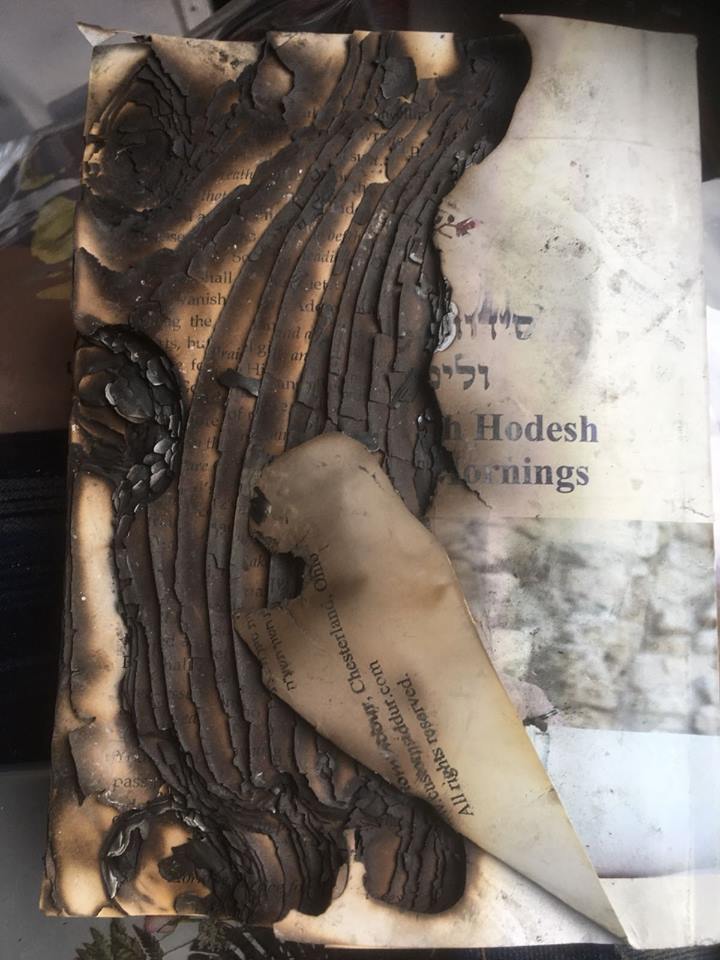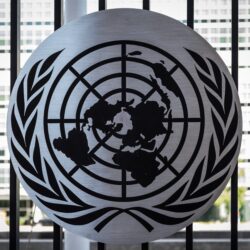| Contribute a translation | Source (English) |
|---|---|
Life Is What We Make It. | |
What are good and evil, truth and falsehood, love and hate, valor and cowardice? | |
What is human destiny, the purpose of man’s existence, the good and the full life? | |
In vain do we seek life’s meaning in the chance event or in the iron law of cause and effect. Neither our successes nor our failures, neither our possessions nor our losses determine life’s trend. | |
Life’s secret resides in the freedom of the spirit, which bends all vicissitudes to its purpose of creating souls, of striking sparks of divinity out of the flint of hard circumstance. Life’s truth is in the power of choice and decision, entrusted to man to fashion a world of beauty and goodness. | |
Good is that which enhances for all alike the worth of human life. Good is that which challenges whatever robs life of its meaning for the weakest and the humblest in God’s Kingdom. Such good is unchanging and valid at all times and in all places. Its source is in God, the Source of all being. Its call and compulsion derive from the inexhaustible Spring of all life. | |
This faith in life’s goodness is not the complacency of the self-contented, of him who finds the world good, because he prospers in all he does. | |
True faith does not avert its eyes from the want and the misery that mar man’s world. It does not stop its ears to shut out the lament of those whose bodies are twisted with pain, or the piercing cry of those whose minds are stricken with terror of death. | |
יְמֵי־שְׁנוֹתֵינוּ בָהֶם שִׁבְעִים שָׁנָה וְאִם בִּגְבוּרֹת שְׁמוֹנִים שָׁנָה וְרׇהְבָּם עָמָל וָאָוֶן כִּי־גָז חִישׁ וַנָּעֻפָה׃ (תהלים צ:י) |
Faint is the voice that bears gladsome tidings, small the measure of happiness in the world. ‘The length of our life is seventy years, perchance through strength eighty years; yet their span is but travail and vanity.’ (Psalms 90:10) |
Our sacred writings unfold a tale of sighs and tears, of sorrow and affliction, of unending strife and anguish of soul. They vibrate with indignant wrath at men’s baseness and depravity. They denounce men’s lust for the power to enslave their fellows. They cover with contempt the mean and groveling ambitions of heartless self-seekers. | |
Despite that, Israel’s faith refuses to pronounce the life of man beyond the reach of hope and betterment. That faith gives us no rest; it ferrets us out of every refuge from the raw realities of life. It bids us share with God in the work of creation. It commands us to bring forth the best that resides in all things, both good and evil. | |
קוֹל קוֹרֵא בַּמִּדְבָּר פַּנּוּ דֶּרֶךְ יְהֹוָה יַשְּׁרוּ בָּעֲרָבָה מְסִלָּה לֵאלֹהֵינוּ׃ (ישעיה מ:ג) |
This is true religion’s call to repentance and redemption: ‘Prepare ye a way for YHVH, a path in the desert for our elo’ah.” (Isaiah 40:3) |
This is a prayer-poem by Rabbi Mordecai Kaplan based on the writings of Rabbi Leo Baeck, as published in the Sabbath Prayer Book (Jewish Reconstructionist Foundation 1945), p.426-7. Dr. Mel Scult writes:
In the early forties, Kaplan working on his 1945 prayer book, fashioned a poem based on the writings of Rabbi Leo Baeck the famous Reform rabbi of German Jewry. The poem based on Baeck in an altered version found its way into the prayer book as “Life is What We Make It.” Here are the concluding lines from the 1942 version: “For true religion is the will to life abundant, the will to face the world and change it, the will to face men and transform them, the will to bring forth the best out of the worst. This is true religion’s call to repentance and redemption. “Prepare ye a way for the Lord, a path in the wilderness for our God [Isaiah 40:3].” found in the Kaplan diary August 23, 1942 , and Communings of the Spirit, ed. Mel Scult, vol 3 page 105-106, and in the Kaplan 1945 prayerbook page 426.
Source(s)


“Life Is What We Make It, a prayer-poem based on the writings of Rabbi Leo Baeck by Rabbi Mordecai Kaplan (1945)” is shared through the Open Siddur Project with a Creative Commons Attribution-ShareAlike 4.0 International copyleft license.










Leave a Reply